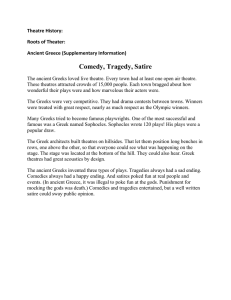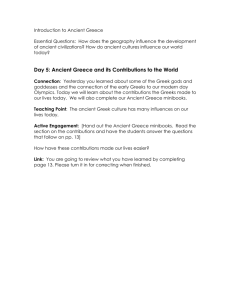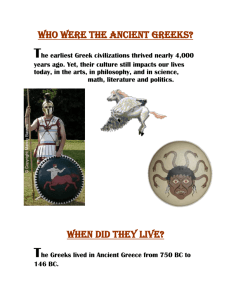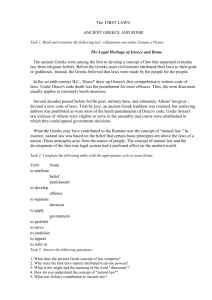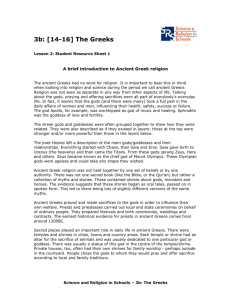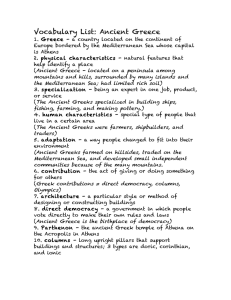Greek Theatre
advertisement
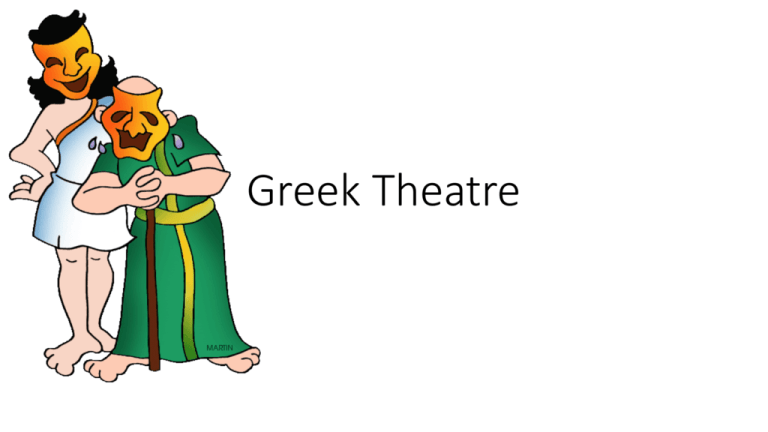
Greek Theatre • In ancient Greece, theatre was a really big deal. • Crowds of 15,000 people would gather to see a play. • Theatre was so important to the ancient Greeks that prisoners would be released from jail temporarily, so they could also attend. • Every town had at least one theatre. • The ancient Greeks were always bragging about the wonderful performances in their city-state. • The ancient Greeks held drama competitions with winners for playwriting and performing. • These competitions were not only held in their own towns, but also in competition with other towns. Theatre was a big, big deal. • Because so many people came to see the plays, the Greeks built huge outdoor theatres on hillsides, so that people could be seated in a way that let them see what was going on down in the orchestra pit - the stage area. • The entire seating section was called the Theatron, which is the origin of our word "theatre". • Part of the reason plays were so important is that originally plays were performed to honor Dionysus, the ancient Greek god of harvest and wine. • But over time, many different gods got in the act, so to speak, especially the 12 Olympians - the major gods of ancient Greece. • The Greeks were always weaving the gods into their stories. There were three types of plays. • Tragedies: The first type they invented was the tragedy. In tragedies, one or more major characters always suffered a disastrous end. Stories always based on myth or history. Dealt with love, loss, pride, abuse of power and relationships between man and the gods. All violence happened off stage. Dealt with love, loss, pride, abuse of power and relationships between man and the gods. Typically the main protagonist commits some terrible crime without realizing how arrogant he has been. He then slowly realized his error and the whole world crumbles around him. There were three types of plays. Comedies: Comedies were invented next. In comedies, plays always had a happy end. Structure of a comedy: • Prologue: Main character conceives a “happy idea • Parados entrance of the chorus • Agon debate between the proponent and opponent of the happy idea. • Parabasis chorus addresses audience on poets view • episode: Happy idea put to practical application There were three types of plays. Satires: Satires were plays that made fun of mortal legends and of real people. In ancient Greece, you did not poke fun at the gods - not in a play, not in real life, not ever. But you could poke fun at your leaders. And that was uniquely Greek. Satires in ancient Greece were often political in nature, and could indeed affect people's opinions about current events. • In Greek drama, the chorus or the singers told the story, not the actors. Actors used gestures and masks to act out their parts. Actors changed roles by changing masks. Greek masks • All of the actors were men. Females were not allowed to participate. • The actors played multiple roles so masks were used to show change in character or mood. • Gestures and body movements were very controlled Probably the most famous actor in ancient Greece was a man named Thespis. Actors today are called thespians in his honor. • With your shoulder partner, compile a list of the facts you came up with during the slide presentation. You have 3 minutes to write down all that you remember.
